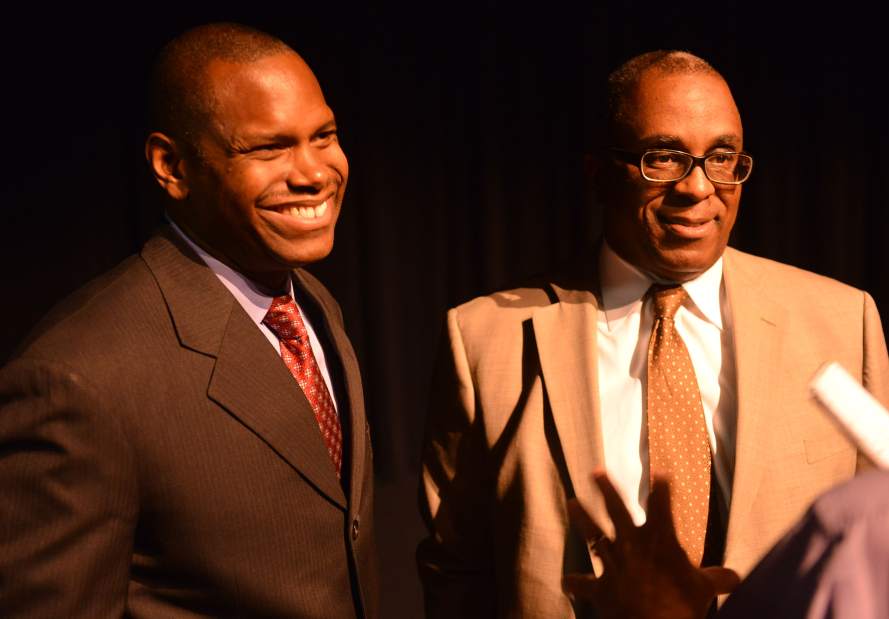https://archive.triblive.com/news/new-members-polite-taylor-join-august-wilson-center-board/
New members Polite, Taylor join August Wilson Center board

James Knox | Trib Total Media
Richard Taylor (left) and Michael Polite speak to reporters Thursday Aug. 27, 2015, after a news conference announcing their appointment to the governing board of the August Wilson Center for African American Culture.
The coalition of foundations that owns the nonprofit August Wilson Center for African American Culture on Thursday named two business executives to a governing board and established a $300,000 programming fund in a strategy to get the newly debt-free Downtown property on track to long-term solvency.
“We've got to make the August Wilson Center a financial success as well as an artistic success,” said Max King, CEO of The Pittsburgh Foundation, which bought the boat-shaped building at a sheriff's sale in November.
Michael Polite, chairman and CEO of urban property developer Ralph A. Falbo Inc., and attorney Richard W. Taylor, CEO of energy-saving lighting supplier ImbuTec, are the first members appointed to the board. Polite is a former economic development authority for the Urban Redevelopment Authority of Pittsburgh, and Taylor is a former Port Authority board member.
“It's less about the building and more about what happens in the building,” said Taylor, 45, of the Hill District.
He envisions the center, named for Pulitzer Prize-winning playwright August Wilson, as a community “focal point” that draws people from across Western Pennsylvania to celebrate African-American art and culture.
The center has been under the control of a temporary board of foundation executives: King, The Heinz Endowments President Grant Oliphant and Richard King Mellon Foundation Director Scott Izzo. Those foundation leaders will step away from the center as its permanent board expands, with Oliphant leaving first.
Initially, King had set a target for installing a permanent board by June.
“We've been moving slowly, and I think a lot of people have been scratching their heads and wondering if we are moving too slowly,” King said as he began a news conference inside the center's 486-seat theater.
Polite and Taylor exemplify “exactly the right kind of fruits of our patient labor, of taking our time to get it right,” King said.
When the $40 million center opened in 2009, the building and all of its operations and programming fell on the responsibility of a single nonprofit, whose board members were numerous and changed often.
“That model actually does not work terribly well in the arts,” Oliphant said.
Plagued by $12 million in debt because of construction overruns, the center flopped in its first five years. The foundations bought the center from mortgage holder Dollar Bank at a Nov. 5 sheriff's sale after a contentious receivership process that dragged on for nearly a year. The $8.85 million deal included $3.15 million in taxpayer money.
Oliphant called the new strategy the “it takes a village” approach.
Taylor, Polite and three members set to be named over the next six months will run the board that owns the center and oversees the facility. Foundation executives want this board made up mostly of black members with expertise in nonprofit facilities management, real estate, business and finance.
A separate, newly formed nonprofit, AWC Renewal Inc., will plan the center's programs. Its initial members include Allegheny County Common Pleas Judge Joseph K. Williams III, attorneys E.J. Strassburger and Jim Abraham and artist Jasiri X.
Pittsburgh Cultural Trust has a management contract to handle the building's rentals and other services such as ticketing and marketing.
The goal is to ensure expertise in each facet of the center.
As things shape up, the center will need to hire a creative or artistic director to be its “point person,” King acknowledged.
The three foundations pledged at least $4.2 million to support the center over three years. The Heinz Endowments has contributed $300,000.
On Thursday, King announced The Pittsburgh Foundation is pumping another $300,000 into a programming fund for the center. The fund will award $25,000 to $100,000 grants to a pool of 61 groups with project ideas in line with the center's mission.
The center recently secured a three-year grant of $125,000 from The Buhl Foundation and applied for a $500,000 grant from the Allegheny Regional Asset District.
Pittsburgh Cultural Trust, which has confirmed 30 event bookings at the center through December, anticipates that rentals will generate about $100,000 in revenue this year.
A “Soul Sessions” gospel, theater and dance series kicks off at the center Sept. 20 with Grammy Award-winning vocalist Gregory Porter. An “I Am August” display featuring 150 photographs of local people will go up at the center Sept. 25 during the trust's quarterly Gallery Crawl.
Natasha Lindstrom is a Trib Total Media staff writer. Reach her at 412-380-8514 or nlindstrom@tribweb.com.
Copyright ©2026— Trib Total Media, LLC (TribLIVE.com)
